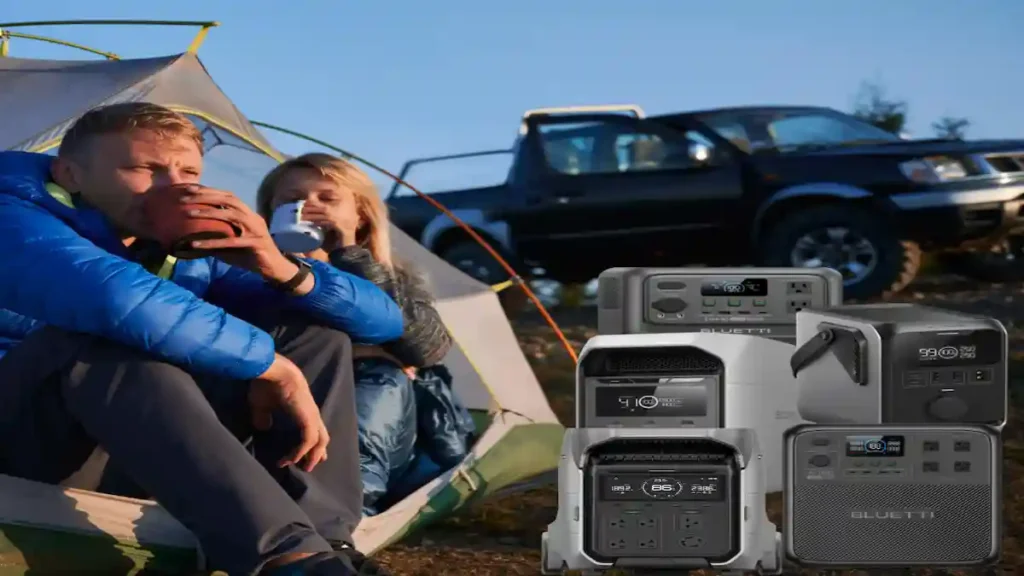RV life is all about freedom — visiting new places, waking to stunning views, and enjoying off-grid adventures. Nothing kills this vibe faster than running out of power. Running lights, a fridge, laptops, or charging devices adds up quickly, which is why having a solar generator you can rely on while out RVing or whole house solar generator in 2026 is necessary.
Last updated by Top Solar Picks on January 2, 2026
Solar generators supply quiet, low-maintenance, clean, onboard power for the open road without gas-powered generators clattering around or empty batteries nagging at the back of your mind. I will take you through the best portable RV solar power stations, advise on how to choose the best solar generators suitable unit, and include answers to most RVers’ questions when selecting a generator. I’ll also give you links to check current prices – these are affiliate links supporting my research at no additional cost to you.
Why a Solar Generator is a Game-Changer for RV Life
A solar generator changes the RV experience completely. Unlike gas generators, they’re quiet, safe indoors, and environmentally friendly. Imagine sitting at a scenic campsite, running your fridge, lights, and laptop, with zero noise and zero fumes — that’s the peace of mind you get.
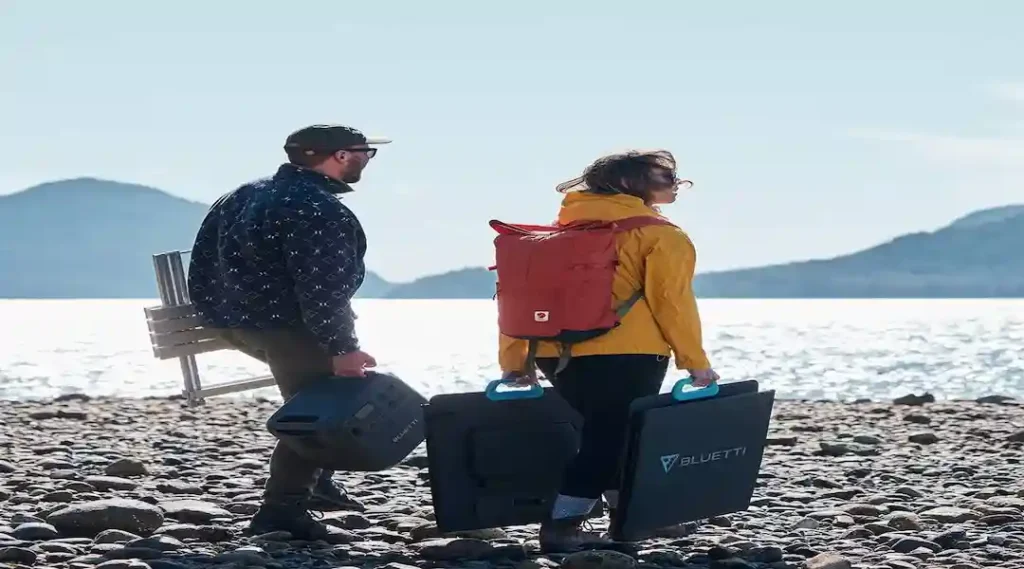
The rate of energy depletion is often underestimated by many RVers. The combination of even an insignificant fridge, lights, and devices could take down a standard-sized RV battery in only hours. This is why a lightweight solar generator for RV camping is no longer just an option; it has become a necessity. It allows you to go farther, stay longer, and with more comfort, without necessarily prohibiting freedom.
How to Choose the Right Solar Generator
Selecting the right generator is essentially about compromise, and it begins with capacity, portability, and an assessment of your actual power needs. What I pay attention to:
- Battery Capacity and Output: Rated in watt-hours (Wh), this indicates how long your devices can run. High-capacity units are needed for longer trips and/or multiple appliances.
Portability: Space is limited in RVs. A generator that’s too heavy or bulky is a pain to store or move.
Charging Options: Can it charge via solar panels, wall outlets, or car? Fast charging saves time.
Battery Type: LiFePO₄ batteries are safer, last longer, and handle more cycles than standard lithium-ion.
Also, the system can run power-sensitive equipment from any of the outlets. An equal number of outlets working at variable voltage, another new generator model can run a wide range of technological items. You will not find this function in a valuable generator. Not sure if you should choose a solar generator or inverter type? Read our comparison — Inverter Gen vs Solar Generator: Difference and Which One to Choose?.
Top Solar Generators for RVs in 2026
After testing and comparing units, here are my favorite solar generators for different RV needs. Each one includes pros, cons, and real-life usage tips, plus an affiliate link at the end of the section.
EcoFlow DELTA 2
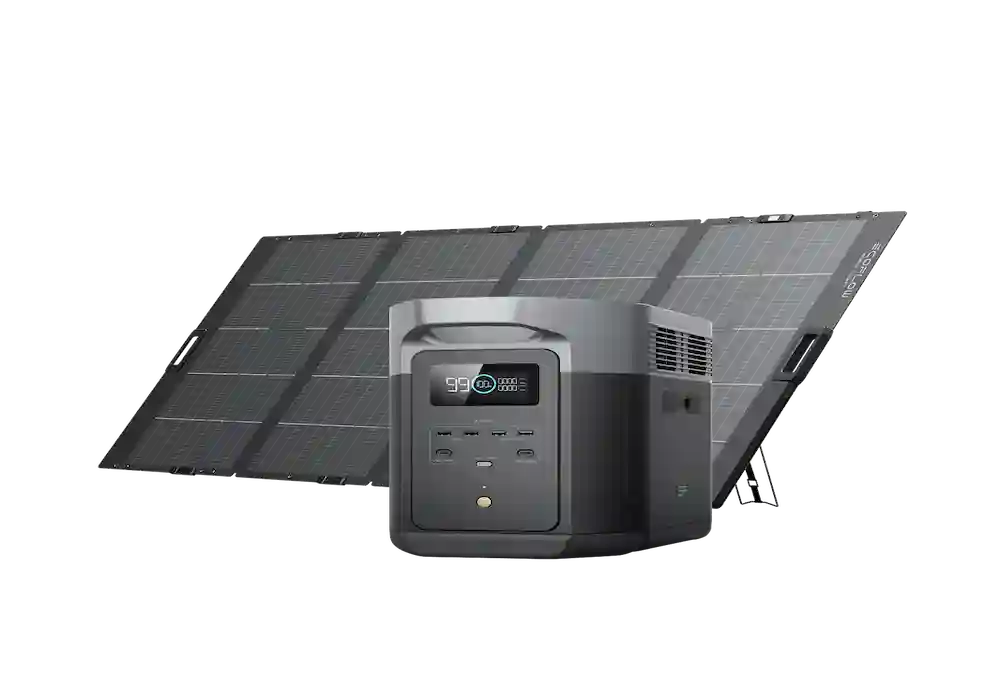
The EcoFlow DELTA 2 is just right for medium-range trips: 1024Wh capacity and 1800W output means it can run a mini-fridge, lights, and various other devices for hours on end. It also has fast charging capabilities — 80% in about 50 minutes, which makes a huge difference when hopping from one campsite to another. If you’re curious how EcoFlow’s newer lineup performs, check out our detailed review — EcoFlow DELTA 3 Series Review: Specs, Performance & Off-Grid Powerhouse.
Pros:
- Fast charging
- Lightweight, compact, and portable
- Different types of outlets (AC, DC, USB)
Cons:
- Mid-range capacity could be limiting for serious off-grid applications
- On the heavier side as compared to ultra-compact models
A Real-Life Tip:
I have used DELTA 2 for a 3-day weekend with a small RV fridge, LED lights, and also charging for my phone/laptop. A 30% battery remained at the end of the period.
Bluetti Elite 200 V2
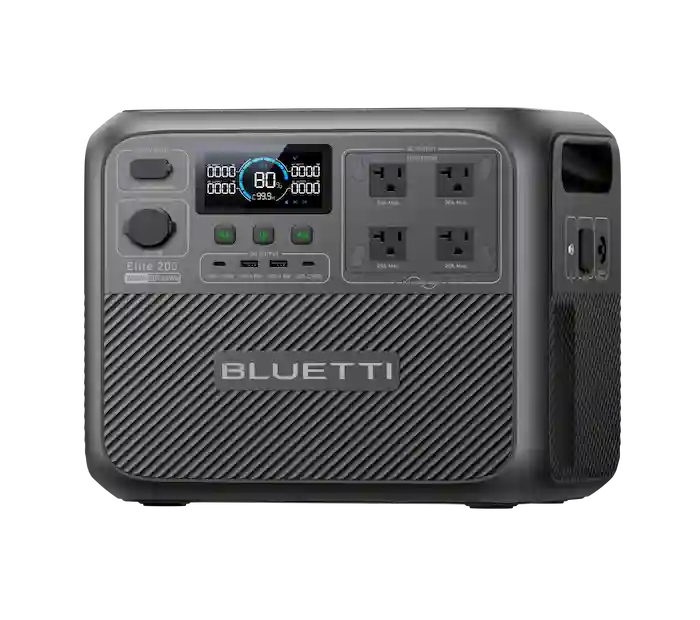
blueetti 200 version 2. A heavy-duty powerhouse for long off-grid trips, the Bluetti Elite200 V2 implies a storage capacity of 2073.6Wh and output of 2600W, allowing for powering them simultaneously on several appliances. The LiFePO₄ battery lasts for ages and can be trusted through all that long trips with it. Want to see how it performs in outdoor conditions? Don’t miss our BLUETTI Elite 200 V2: A Reliable Companion for Camping Adventures
Pros:
- Massive storage capacity for long-time trips
- Durability feature of LiFePO₄ batteries
- Large appliances such as microwave or coffee maker will run smoothly on its load
Cons:
- Heavy and a bit bulkier compared to small ones.
- Slower fast charge compared to EcoFlow.
Real-Life Tip:
I was camping for three days, and I used my fridge, LED lights, fan, and small induction cooktop for an entire day, with solar panels charging it fully under the afternoon sun.
EcoFlow Delta 3 Plus
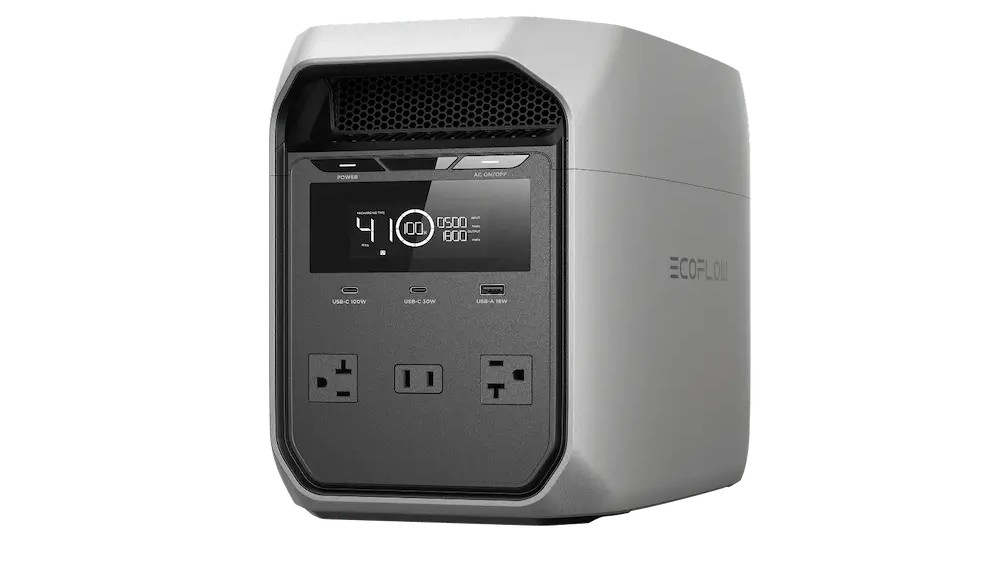
The Delta 3 Plus is an ideal model that can provide high output and expand according to your preference. It’s so powerful it can run heavy loads and can still operate with additional solar panels for the continuous off-grid energy supply.
Advantage:
High output, can easily be used with extra solar panels.
Very reliable, easy-to-understand interface.
Light for its size.
Disadvantage:
More expensive than mid-range offers.
Takes up some space.
Real-life tip:
With this generator, a medium fridge, lights, laptops, and a small heater could run overnight for a family of 4 at a mountain camping site.
The Delta 3 Plus is ideal if you need high output and expandable capacity. It’s robust enough for heavy loads and can work with extra solar panels for continuous off-grid energy.
Pros:
- High output, expandable with extra solar panels
- Durable, user-friendly interface
- Lightweight for its capacity
Cons:
- Pricier than mid-range options
- Slightly larger footprint
Real-Life Tip:
For a family of four, this generator kept a medium fridge, lights, laptops, and a small heater running overnight during a mountain camping trip.
Jackery Explorer 2000 Plus
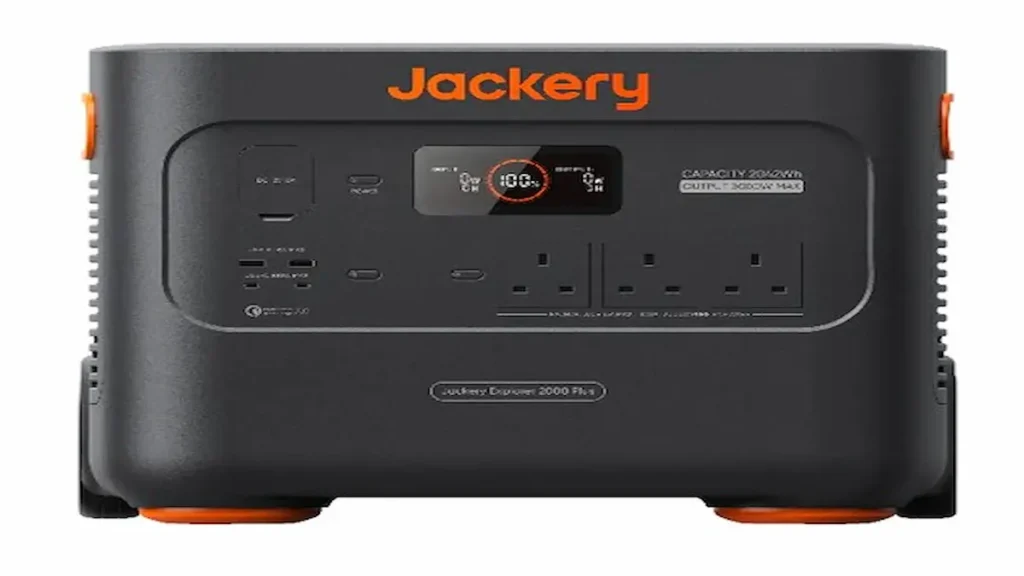
The Jackery Explorer 2000 Plus is known for simplicity and reliability. Its 2200Wh capacity is enough for most multi-day RV trips, and it has an intuitive interface. For a deeper dive into its real-world performance and charging tests, read our Jackery Explorer 2000 Plus Review: Reliable Power Anywhere
Pros:
- Beginner-friendly interface
- Reliable and durable
- Multiple outlet options
Cons:
- No LiFePO₄ battery, so lifespan is shorter than Bluetti
- Bulkier for one-person transport
Real-Life Tip:
Perfect for solo or couple trips where you need moderate power. I used it to power a mini-fridge, LED lights, and charge two laptops for three days with only partial solar recharge.
Bluetti Elite 30 V2 & EcoFlow Trail
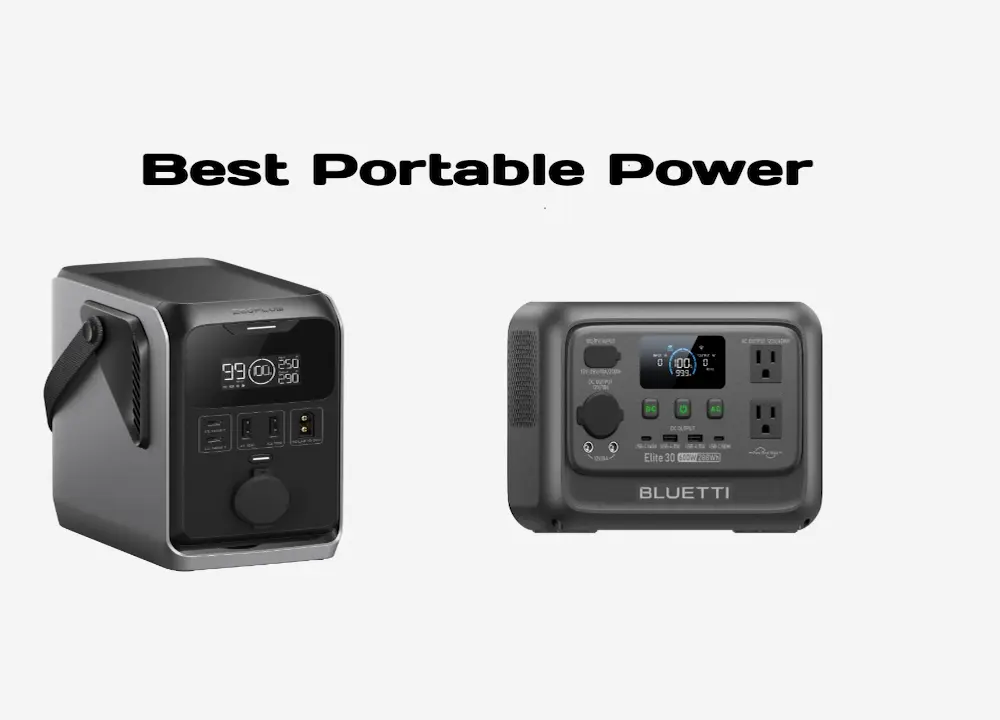
Compact and lightweight, these models are excellent for short trips or weekend camping. Ideal for charging phones, tablets, LED lights, or a mini-fridge. For a closer look at this compact powerhouse, see our EcoFlow Trail Power Stations Review: Keep Phones & Cameras Charged Anywhere.
Pros:
- Ultra-portable
- Easy to store in small RVs
- Simple to use
Cons:
- Limited capacity for multiple appliances
- Not ideal for extended trips
Real-Life Tip:
Great for a 2-night trip with a small RV fridge and lights. I left my laptop charging while cooking meals on a gas stove, and the battery lasted the whole weekend. You can also read our quick comparison — Bluetti Elite 30 V2 vs EcoFlow Trail 300 DC: Quick Specs & Comparison (2025)
Buy now – Bluetti Elite 30 V2
Buy now – EcoFlow Trail
Bluetti AC180
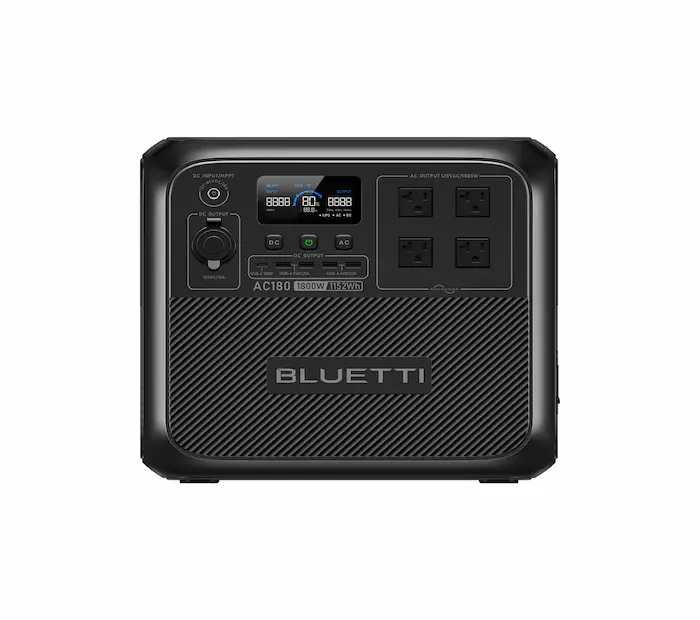
The Bluetti AC180 hits the sweet spot for mid-sized RVs. It can handle multiple devices at once while remaining portable.
Pros:
- Medium capacity for a wide range of RV setups
- Lightweight compared to similar power
- Multiple outlets
Cons:
- Not ideal for very heavy appliance use
- Limited expansion options
Real-Life Tip:
I’ve used this for 3-day trips with a small fridge, lights, and multiple devices. Adding a 200W solar panel kept it topped off perfectly.
Maximizing Your Solar Generator’s Efficiency
Here’s how to get the most out of your generator:
Plan Your Energy Use: Know how much wattage your devices consume and prioritize essentials.
Pair With Solar Panels: Even a modest 200–400W panel setup can recharge generators during the day.
Monitor Battery Health: Avoid full depletion and keep track of usage via apps or built-in displays.
Distribute Load Smartly: Plug high-draw appliances into AC outlets, and smaller electronics into USB ports.
EcoFlow vs Bluetti: Which is Better for RV Use?
EcoFlow: Great for portability, fast charging, and convenience. Perfect for medium-length trips.
Bluetti: Focuses on high capacity and long-term reliability. Ideal for multi-day trips and heavy appliance use.
Both are excellent, so it comes down to whether mobility or capacity is your priority. For an in-depth analysis of how these brands compare across models, check out our guide — EcoFlow vs Bluetti vs Zendure – Best Solar Generator for Home 2025
How to Power RV Appliances With Solar
Even a small solar generator can handle basic RV appliances:
Fridges: Run 12–20 hours depending on capacity
Lights: Minimal energy draw, easy to power all night
Laptops/Phones: Use USB or AC outlets
Small Heaters/Cooktops: Only with high-capacity units like Bluetti 200 V2
Pairing your generator with solar panels extends run-time and keeps your batteries topped off during sunny days.
If you’re setting up a full off-grid system or upgrading your solar setup, these guides will help you take the next step.
Related Posts You Might Like
Best Batteries for Off Grid Solar in 2025 (Bluetti, EcoFlow & Eco-Worthy Reviewed)
Eco Worthy Battery Review: A Deep Dive Into 51.2V Server Rack Features
Solar Panel Dimensions & Space Calculator: Plan Your Solar Setup Easily
Maxeon Solar Panels Review 2025: Price, Specs & Long-Term Value Explained
Frequently Asked Questions
Can I run my fridge with a solar generator?
Yes! High-capacity models like Bluetti Elite 200 V2 or Jackery Explorer 2000 Plus can run a fridge 12–20 hours depending on usage.
Are solar generators safe indoors?
Absolutely. Unlike gas generators, they produce no fumes or noise, making them safe for enclosed spaces like RVs.
How many solar panels do I need?
200–400W solar panels typically recharge most generators in 4–6 hours of sunlight.
Can I charge my generator while driving?
Yes, most models allow charging via car outlets, which is perfect for long travel days.
Do I need a solar panel?
Not mandatory, but highly recommended. Solar panels keep your generator topped off and extend off-grid freedom.
What’s the best lightweight generator for weekend trips?
Bluetti Elite 30 V2 or EcoFlow Trail — compact, portable, and ideal for short adventures.
Final Thoughts
Choosing the right solar generator can make your RV trips stress-free, eco-friendly, and more enjoyable. High-capacity units like EcoFlow DELTA 2, Bluetti Elite 200 V2, and Jackery Explorer 2000 Plus are perfect for extended trips, while compact units like EcoFlow Trail or Bluetti Elite 30 V2 are great for weekends.
By understanding your energy needs, battery capacity, and solar panel options, you can confidently go off-grid anywhere. Check the links above to see current prices — each is an affiliate link supporting our testing and content at no extra cost to you.
Author
Top Solar Picks comprises solar enthusiasts and certified installers with more than 15 years of combined experience in renewable energy systems. Based in the heart of sunny Texas, our team has personally tested hundreds of solar generators, panels, and batteries.

